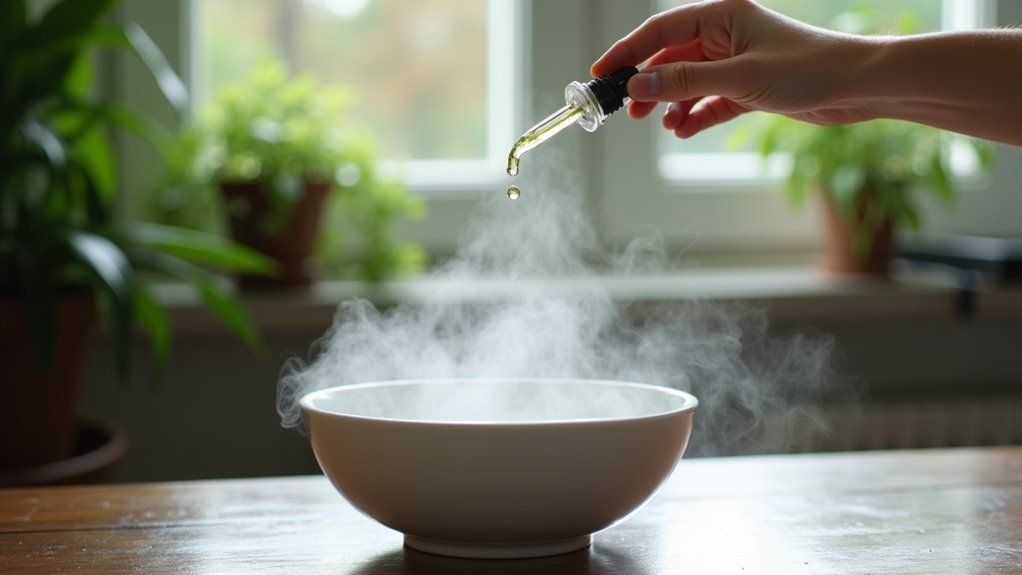Natural Remedies for Congestion That Help You Breathe Easier
You can find quick relief from nasal congestion through several natural remedies. Try steam inhalation with eucalyptus oil, which helps clear airways and reduce inflammation. Drink ginger tea with honey to thin mucus and soothe irritated passages. Use a neti pot with saline solution to flush out allergens, and practice alternate nostril breathing to balance your airways. Maintaining proper humidity levels and staying hydrated will enhance these remedies’ effectiveness. Discover more powerful solutions to breathe freely using nature’s healing properties.
Understanding Common Causes of Nasal Congestion
While nasal congestion can feel like a simple stuffy nose, it actually occurs when blood vessels in your nasal passages become inflamed and swollen. Several factors can trigger this inflammation, including viral infections like the common cold, seasonal allergies, sinusitis, or environmental irritants.
Understanding these root causes is essential before exploring congestion remedies. You might experience congestion when your immune system responds to allergens, producing excess mucus as a defense mechanism. Other triggers include changes in temperature, dry air, or exposure to strong odors.
Identifying your specific triggers helps you choose the most effective natural treatment approach and prevent future episodes.
Steam Inhalation and Aromatherapy Solutions
Once you’ve identified your congestion triggers, steam inhalation offers a gentle yet powerful way to find relief.
Fill a bowl with hot water and create a tent over your head with a towel. Breathe deeply for 5-10 minutes to let the warm vapor clear your nasal passages.
For enhanced benefits, add essential oils like eucalyptus, peppermint, or tea tree to your steam therapy.
These oils contain natural decongestant properties that help reduce inflammation and thin mucus. You’ll find immediate relief as the aromatherapeutic compounds open your airways and promote easier breathing while supporting your body’s natural healing process.
Adding lavender essential oil can help soothe irritated nasal passages while providing congestion relief.
Essential Oils That Clear Airways
When you’re struggling with nasal congestion, essential oils like eucalyptus and peppermint can provide quick, natural relief through their potent decongestant properties.
You’ll find steam inhalation particularly effective – simply add 3-5 drops of eucalyptus oil to a bowl of hot water, drape a towel over your head, and breathe deeply for 5-10 minutes.
For extended relief, try applying a chest rub made with peppermint oil mixed into a carrier oil like coconut or jojoba, which can help keep your airways clear throughout the night.
Adding lavender and chamomile essential oils can provide additional calming effects while clearing congestion.
Steam Inhalation With Eucalyptus
Steam inhalation with eucalyptus oil offers a powerful, natural way to clear congested airways and ease breathing difficulties.
Pour hot water into a large bowl, add 3-5 drops of eucalyptus essential oil, and drape a towel over your head while you lean over the bowl. As you breathe in the medicated steam for 5-10 minutes, the oil’s active compound eucalyptol helps break up mucus and reduce inflammation in your nasal passages.
For best results, repeat this treatment 2-3 times daily. Keep your eyes closed during the process and maintain a comfortable distance from the steam to avoid burns.
Peppermint Oil Chest Rub
A soothing peppermint oil chest rub provides natural relief from congestion while promoting easier breathing.
The menthol in peppermint oil acts as a natural decongestant, helping to open your airways and thin mucus for easier expectoration.
To create your chest rub, mix 5 drops of peppermint essential oil with 2 tablespoons of carrier oil like coconut or jojoba.
Gently massage the mixture onto your chest and throat before bedtime. The cooling sensation will last for several hours.
Studies show that topical peppermint oil applications can help reduce inflammation in your respiratory tract and provide significant relief from nasal congestion symptoms.
Dietary Changes to Reduce Mucus Production
Your dietary choices can significantly influence mucus production and respiratory congestion. Making specific changes to your eating habits can help reduce excess mucus and ease breathing difficulties naturally.
-
Eliminate dairy products temporarily, as they’re known to increase mucus thickness and production in many people.
-
Add anti-inflammatory foods like ginger, turmeric, and garlic to your meals to help reduce respiratory inflammation.
-
Increase your intake of citrus fruits and leafy greens rich in vitamin C to boost immune function.
-
Stay hydrated with warm liquids like herbal teas and broths to thin mucus and support easier expectoration.
Maintain these dietary modifications for at least two weeks to notice improvements in congestion symptoms.
Adding some spicy foods to your meals can help clear congestion while strengthening your respiratory system.
Herbal Teas and Natural Decongestants
You’ll find rapid relief from congestion by inhaling steam infused with peppermint oil, which naturally opens airways and soothes irritated nasal passages.
Drinking ginger root tea can help reduce inflammation while thinning mucus, making it easier to breathe and expel excess phlegm.
For targeted decongestion, try eucalyptus-based nasal treatments, which clinical studies show can effectively clear sinus passages and provide lasting respiratory comfort.
Maintaining proper humidity levels between 30-50% in your home environment helps prevent nasal passage irritation and congestion.
Steam With Peppermint Oil
While many over-the-counter decongestants offer quick relief, steam therapy combined with peppermint oil provides a natural, effective solution for clearing stuffy nasal passages.
The aromatic compounds in peppermint oil help reduce inflammation and open your airways.
To use this remedy effectively:
- Add 3-5 drops of peppermint essential oil to a bowl of hot water
- Cover your head with a towel and position your face about 12 inches above the steam
- Breathe deeply through your nose for 5-10 minutes
- Repeat this process 2-3 times daily, especially before bed
This method helps loosen mucus and reduces sinus pressure naturally.
Ginger Root Tea Benefits
Along with steam therapy, ginger root tea stands as another powerful natural decongestant in your wellness arsenal.
When you drink this warming brew, its active compounds, including gingerols and shogaols, help reduce inflammation in your nasal passages and throat.
You’ll find that ginger root tea thins mucus secretions, making it easier to clear your airways.
The tea’s natural antiviral properties also support your immune system while fighting respiratory infections.
For best results, steep fresh ginger root in hot water for 10 minutes and add honey for extra soothing benefits. It’s most effective when consumed 2-3 times daily while you’re congested.
Eucalyptus Nasal Treatment
A potent eucalyptus nasal treatment can provide immediate relief from stubborn congestion through its natural decongestant properties.
This ancient remedy works by opening your airways and reducing inflammation in your nasal passages.
- Add 5-10 drops of eucalyptus essential oil to hot water for steam inhalation
- Apply diluted eucalyptus oil to your chest and neck area before bedtime
- Use a eucalyptus-infused saline nasal spray for targeted relief
- Place eucalyptus leaves in your shower for aromatherapy benefits
You’ll find eucalyptus particularly effective when combined with steam therapy, as heat helps release its active compounds, maximizing its decongestant effects.
Nasal Irrigation Methods and Benefits
Many people find nasal irrigation to be one of the most effective natural methods for clearing congestion and maintaining sinus health.
You can use a neti pot, squeeze bottle, or nasal bulb to flush your nasal passages with sterile saline solution, which helps remove mucus, allergens, and irritants.
To perform nasal irrigation safely, always use distilled, boiled, or filtered water at room temperature.
Mix it with the correct amount of pharmaceutical-grade salt.
Lean over a sink, tilt your head sideways, and let the solution flow through one nostril and out the other, effectively clearing your nasal passages.
Beneficial Breathing Exercises and Techniques
While nasal irrigation helps clear physical blockages, specific breathing exercises can further improve airflow and provide relief from congestion.
You’ll find these breathing techniques particularly effective when practiced regularly, especially during periods of respiratory discomfort.
-
Practice alternate nostril breathing (Nadi Shodhana) to balance your nasal passages and reduce inflammation.
-
Try pursed-lip breathing to release trapped air and decrease chest congestion.
-
Perform diaphragmatic breathing to strengthen respiratory muscles and increase oxygen flow.
-
Use the 4-7-8 breathing technique to relax your airways and reduce stress-related congestion.
These evidence-based exercises work best in a calm, upright position, allowing gravity to assist in draining congested airways.
Home Remedies Using Kitchen Ingredients
Common kitchen ingredients offer powerful natural solutions for relieving nasal and chest congestion. You’ll find relief using ginger tea with honey, which reduces inflammation and soothes irritated airways.
Add a dash of cayenne pepper to warm water to thin mucus and promote drainage. Apple cider vinegar’s antimicrobial properties help fight infection when mixed with water and sipped throughout the day.
Create a potent decongestant by combining minced garlic, lemon juice, and raw honey. For steam inhalation, boil water with thyme or oregano.
You can also try mixing turmeric with warm milk for its anti-inflammatory benefits. These ingredients work naturally to clear your airways.
Studies show that elderberry extract can reduce cold duration by up to 60% when taken at the first sign of symptoms.
Environmental Adjustments for Better Breathing
Beyond natural remedies from your kitchen, simple changes to your home environment can significantly improve breathing and reduce congestion.
Creating an optimal breathing space involves controlling humidity, reducing allergens, and maintaining air quality.
-
Keep indoor humidity between 30-50% using a humidifier or dehumidifier to prevent mold growth and ease respiratory discomfort.
-
Remove dust regularly and use HEPA air filters to capture airborne particles that trigger congestion.
-
Place indoor plants like spider plants or peace lilies to naturally purify air and increase oxygen levels.
-
Elevate your head while sleeping using an extra pillow to promote sinus drainage.
Preventive Measures and Lifestyle Changes
You’ll find that maintaining clean air in your living spaces, through regular dusting and air purification, forms the foundation of respiratory health.
Staying well-hydrated helps thin mucus and supports your body’s natural defense mechanisms against congestion-causing irritants.
Regular breathing exercises and moderate physical activity strengthen your respiratory system, making you more resilient to congestion-triggering factors.
Keep Air Clean Daily
Maintaining clean air in your living space plays a vital role in preventing nasal congestion and respiratory issues.
You’ll breathe easier by implementing these proven strategies to minimize airborne irritants and allergens in your home environment.
-
Install HEPA air purifiers in bedrooms and living areas to filter out dust, pollen, and pet dander.
-
Keep humidity levels between 30-50% using a dehumidifier to prevent mold growth.
-
Vacuum carpets and upholstery twice weekly with a HEPA-filtered vacuum cleaner.
-
Change HVAC filters monthly and schedule professional duct cleaning annually.
These evidence-based practices help create a healthier indoor environment that supports your respiratory wellness naturally.
Stay Well-Hydrated
Proper hydration serves as a cornerstone in preventing and managing nasal congestion naturally. You’ll want to drink at least 8-10 glasses of water daily to keep your nasal passages moist and help thin mucus secretions.
Start your morning with warm water and lemon to jumpstart hydration and support your immune system.
Beyond plain water, you can boost your fluid intake with herbal teas, particularly those containing ginger, peppermint, or thyme. These herbs provide additional decongestant properties.
Avoid caffeine and alcohol, as they can contribute to dehydration and worsen congestion.
Consider using a humidifier to maintain optimal moisture levels in your environment.
Exercise Your Respiratory System
While many people focus solely on treating congestion after it occurs, regular respiratory exercises can significantly strengthen your breathing capacity and reduce the likelihood of nasal blockages.
Taking a proactive approach to respiratory health can make a noticeable difference in how well you breathe daily.
- Practice diaphragmatic breathing by lying flat and placing one hand on your chest and another on your belly
- Try pursed-lip breathing exercises to strengthen your lungs and clear airways
- Perform alternate nostril breathing to balance your nasal passages
- Incorporate humming exercises, which can increase nitric oxide production and improve respiratory function







